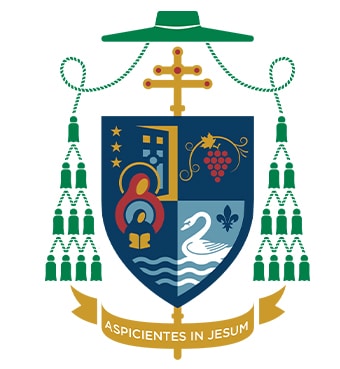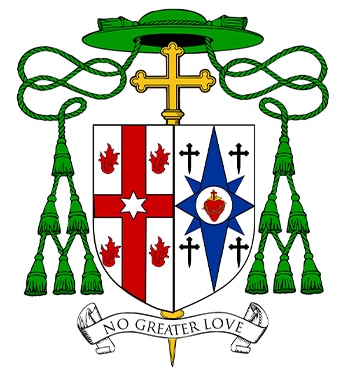What do we Mean by “Full of Grace?”
by Stephen Beale
 No greeting has ever been more troubling—or controversial.
No greeting has ever been more troubling—or controversial.
Hail Mary, full of grace.
The words are beautiful, angelic, and rich in meaning. They are also a centuries-long fault line between Protestants and Catholics. Everything, it seems, hangs upon what is meant by full of grace, or whether full of grace is even the correct translation of Luke 1:28. In Latin, the phrase becomes two words: plena gratia. In the original Greek, it’s just one, the phonetically unwieldy but potent in meaning verb, kecharitōmenē.
The case for the Catholic reading of this is not only far more compelling than Protestant critics will let on, but also far stronger than many Catholics today probably realize.
But first, a word about how to read Scripture. A common Protestant critique is that it is irresponsible for Catholic apologists to read so much into just one word, phrase, or a single verse. It’s something we often hear in familiar Catholic-Protestant debates. Does the rock in Matthew 16:18 refers to Peter (the Catholic position) or his faith (the Protestant claim)? Or what is the meaning of “is” in the words of institution at the Last Supper? No matter how convincing the Catholic claim becomes, it becomes the ultimate fallback for the Protestant skeptic: one verse can hardly be the foundation for an entire dogma.
Setting aside for the moment that the dogmas at issue in the above debates actually have broad Scriptural support, such criticisms are extraordinarily disingenuous for a group that has made Sola Scripture the shibboleth of faith. It’s also out of character with the spirit of the early Church. Take this reflection from one Church Father, St. Basil:
Every deed and every word of our Savior Jesus Christ is a canon of piety and virtue.  When thou hearest word or deed of His, do not hear it as by the way, or after a simple and carnal manner, but enter into the depths of His contemplation, become a communicant in truths mystically delivered to thee.
When thou hearest word or deed of His, do not hear it as by the way, or after a simple and carnal manner, but enter into the depths of His contemplation, become a communicant in truths mystically delivered to thee.
Basil is talking about Christ’s words in particular, but his statement could just as easily describe how the Church has traditionally approached all Scripture. They are just a few words, but God’s declaration to Moses in Exodus 3:14—I am Who I am—have shaped centuries of theological thought about God’s being. Christ is referred to as the Word just four times in Scripture (John 1 and 1 John 1), but Christology today is unthinkable without the epithet. The same goes for Christian anthropology and Genesis 1:27 (man was made in the “image” and “likeness” of God).
Now let’s return to Luke 1:28. The theological debate begins with a textual question. What exactly does Luke 1:28 say? Is he talking about grace, that most potent of theological words? Or is Mary simply ‘favored’ by God, as so many Protestant translations read?
Some evangelical Protestant apologists will play a semantic shell-game. They seize upon the fact that full of grace is taken from the Latin plena gratia, not directly from the Greek text. Full of grace, they point out, appears in the Greek in two other verses, not this one. (Click here to see one example.) The argument is presented as a rebuttal of the Catholic position and it plays neatly into Protestant stereotypes about Catholics not knowing their Bibles.
This raises the question as to how to translate the word at issue (kecharitōmenē) in the first place. The word is a form of the verb charitoō. This word should look familiar, even to non-Greek speakers. It’s where we get our word charisma, which refers to someone’s gift as a leader. In ancient Greek, the companion noun was charis, the stock New Testament word forgrace. Although it’s sometimes translated as favor, it overwhelmingly is rendered in the King James Bible as grace. (Out of 156 instances, 132 read asgrace, while just 7 are favor. Most of the rest appear to be translated as a form of thanks.)
We are right to suspect that charitoō then has something to do with grace as we understand it. And that’s exactly how it’s defined. Vine’s Expository Dictionary of New Testament Words defines the verb this way: “to endow with charis, primarily signified ‘to make graceful or gracious,’ … ‘to cause to find favor.’” Thayer’s Greek Lexicon puts it this way: “to pursue with grace, to compass with favor.” Another dictionary drops “favor” altogether and gives us this definition: “kecharitōmenē … means endowed with grace.”
However, these definitions do leave it open-ended as to whether grace orfavor is the way to go. Although favor and grace have related meanings they remain distinct. In a theological context, grace is a free and unmerited gift of God. Grace is something given to someone. Usually we think of a favor as something done for someone else. So which way do we go in Luke 1? Unlike the noun, the verb is used only one other time in the New Testament, so we don’t have too many verses to guide us on how it’s used. (For the record, the other instance is Ephesians 1:6 and the most common translation is grace.)
Fortunately, the text does not leave us hanging. After Mary’s initial apprehension, the angel tells her, “Fear not, Mary, for thou hast found gracewith God” (Luke 1:30). Grace here is the noun charis, which we’ve already established usually means grace and only rarely favor (in the New Testament at least). If Luke 1:28 was unclear, Luke 1:30 is our clarification. This should settle it. We’re talking about grace.
Now our question becomes: How much grace did Mary receive and when? The dogma of the Immaculate Conception holds that Mary was fully graced from the moment of conception, that through the grace of God, Mary’s life was one without sin. Is this supported by Luke 1:28?





